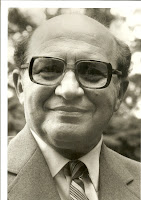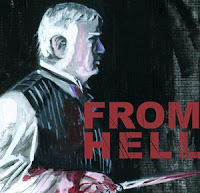Why is there something rather than nothing? The question seems valid at first glance, and probably at second and third glances, as well. It seems easy to imagine a "world" where there is "nothing," but to have this vast universe around us seems somehow special, somehow worthy of wonder. There could have been nothing, the question implies, but look: we've got something, and that something is a big something, and it demands an explanation. It's all very intuitive. However, there's something--to use that devious word--very wrong with the question of why there's something rather than nothing. Beneath the intuitiveness, it reveals a drastic and unfounded presupposition about the entire universe: that "something" is more likely than "nothing." I say "unfounded" not because the opposite is true, but because we simply don't actually know, despite all our feelings on the matter, that one is more likely than the other.
 |
| Grunbaum |
 |
| Copleston and Russell |
This can be a bit startling. All of a sudden, it seems possible that, even if the universe emerged in the Big Bang, whatever makes the formation of univeres possible--the "quantum foam" that produces "bubbles" of universes due to gravity, for instance, to paraphrase Stephen Hawking--may have simply always been there, and we were wrong to assign a probability to it at all. Maybe there is a probability to universes forming out of this quantum foam, but not to the quantum foam itself being there. In a conversation with Jim Holt in Why Does the World Exist: An Existential Detective Story, Grunbaum says that while he will "grant that nothingness may be the simplest [thing to imagine] conceptually," we still have to ask why this concept applies to actual existence, to reality--that is, "what makes simplicity into an ontological imperative?" And, lest you think that "before" the Big Bang there was indeed absolute nothingness, Grunbaum adds that "Physics does not allow us to extrapolate back and say, 'Before this singularity there was nothingness. That's an elementary mistake...the lesson of the Big Bang model is that before the initial state there was no time.'" As Holt writes later, reflecting on his discussion with Grunbaum, the singularity is where relativity breaks down and where time ceases to have clear meaning.
"Unlike the beginning of a concert," he writes, "the singularity at the beginning of the universe is not an event in time. Rather, it is a temporal boundary or edge. There are no more moments of time 'before' t = 0. So there was never a time when Nothingness prevailed. And there was no 'coming into being'--at least not a temporal one. As Grunbaum is fond of saying, even though the universe is finite in age, it has always existed, if by 'always' you mean at all instants of time." And so, "[i]f there was never a transition from Nothing to Something, there is no need to look for a cause, divine or otherwise, that brought the universe into existence." The steady-state theory, basically, has been married to the Big Bang in one sense--while the universe did "appear" at the Big Bang, it has, strictly speaking, always been around, and there is no "before" the Big Bang in which there was nothing at all.
 |
| Krauss |
And, more simply, Grunbaum asks, "What could possibly be more commonplace empirically than that something or other does exist?" In other words, we have been observing something since we could observe at all, and "something" is the easiest of all things to observe--indeed, the only thing we have ever truly observed. To observe nothing is a hell of a thing; I'm not sure it's even possible, given that nothing is, well, nothing. And that leads to the question being flipped on its head: what makes us think "nothing" is the natural way for things to be, and "something" is unusual? Do we have any evidence to prove that nothingness is, in fact, far more likely than anything--again, even down to forces--existing? And the fact is that we don't. The whole bit of probability that something is less likely than nothing is based on a presupposition, not an actual observed fact. Again, this common-sense-but-meaningful observation from Grunbaum doesn't make the question about something and nothing into a pseudo-question (as Grunbaum calls it) we can dispense with, but it does mean we need to stop looking at the universe, the something, around us as if we are standing outside it; after all, from that view, it is easy to think there is the universe and then black empty space around it, but we have no idea what, if anything, can be said to be outside the universe, except perhaps for other universes, and it's not at all clear that other universes exist, popular as the multiverse hypothesis is. By looking at the universe from where we are, not an articifial invented position "outside" of it, we see the something we know, and there is not as yet any clear proof that there is nothingness or that nothingness is more common than its opposite (though we must be careful here too not to speak of nothingness as if it is a distinct thing, like that "empty" space. In short, this is far from resolved, but we at least know we have "something" so far).
None of this makes God impossible, mind you. Indeed, William Lane Craig, attempting to get around the problem of time and the singularity, suggests that God, while himself timeless (whatever that somewhat cheap expression may mean), may have produced the universe at the same moment he intended to create it, so intention and creation are all concurrent, and there is no need to say God existed "before" anything else began to exist (despite God being, in Craig's view, eternal and necessary). But it's very odd to imagine an intention literally being simultaneous with an action--downright impossible, actually, going by anything we know about neuroscience. (Of course, to assume God's mind, if God exists, is like a human's is to commit the same fallacy Russell chided Copleston for, but that does not mean anything one says about God is therefore somehow worthy of having a free logical pass.) It's a real problem to simply get rid of God's involvement with the singularity by saying that he is "timeless," since this word has no clear meaning--or none I've seen as yet. And, if you imagine that God and the universe--the "something"--are one and the same, as in pantheism (but not panentheism), there's no real contradiction. And Krauss himself, in his book, says that "on the basis of logic alone one cannot rule out such a deistic view of nature"--not a view he accepts or that has evidence going for it, but one that can't absolutely be ruled out. But, if you imagine that God is a personal god, and that this god is logically necessary--that this god, in other words, cannot not exist--and is not equivalent to the universe, you may have run into some trouble. Quite aside from the temporal problems raised by relativity breaking down at the Big Bang, the fact remains that we cannot assume "having a universe" is less likely than "nothing" and that, therefore, the universe's creation is somehow special and requires a special creator. This assumption is just that--an assumption. Whatever allows for the production of universes, like gravity in the theoretical model Hawking and Leonard Mlodinow present in The Grand Design, may simply take the place of God as a "necessary" force--and maybe there's no real reason to think this is strange or special.
My intution rages at this. And it's true there is a lot we have to learn. It may, in fact, be true that something is less likely than nothing. Who knows. But that's precisely the point: no one knows. And, going by what we have to observe around us, and everything we have discovered in cosmology so far, it would appear that nothingness is not, in fact, somehow more likely than something. And even if it is, and we all just popped into existence in a way so absurd that even Camus would crack a smile, none of that has to involve a divine creator. God, of course, could have popped into existence along with the universe--but how superfluous is that, eh? Our origins are still shrouded in mystery, hidden behind a veil we may never be able to part, but things still seem better for us at the moment than for personal gods.
 |
| Arif Ahmed |
Ahmed and his partner lost the debate, seemingly largely because many people did not want to cast votes that appeared to insult the opposite side by saying they were deluded. But the real loser may be our age-old question, "why is there something rather than nothing?" We must elevate the discussion and stop making assumptions like the ones embedded in this question, even if those assumptions have dug deep roots inside us. By doing so, things may become much more confusing and chaotic for a time--but that can be a good thing, if that confusion and chaos leads us closer to the truth. And, while our intuitions are often correct, we must be prepared to accept that some of them may be very wrong.
Some links: Russell/Copleston debate: http://www.youtube.com/watch?v=9t-oME07OVI
Lawrence Krauss's "A Universe from Nothing" lecture: http://www.youtube.com/watch?v=EjaGktVQdNg
Cambridge debate with Arif Ahmed: http://www.youtube.com/watch?v=HYlQL-Gakh0











